高中英语必修一unit1Grammar
- 格式:ppt
- 大小:1.47 MB
- 文档页数:50

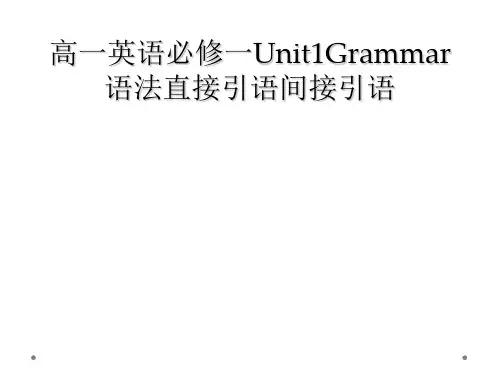
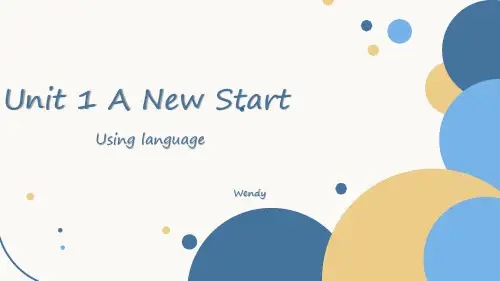
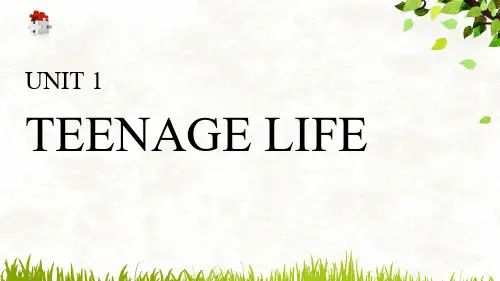
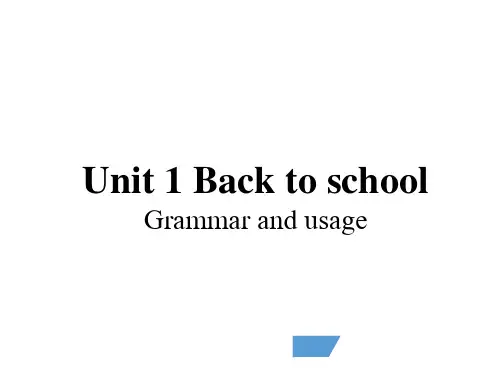
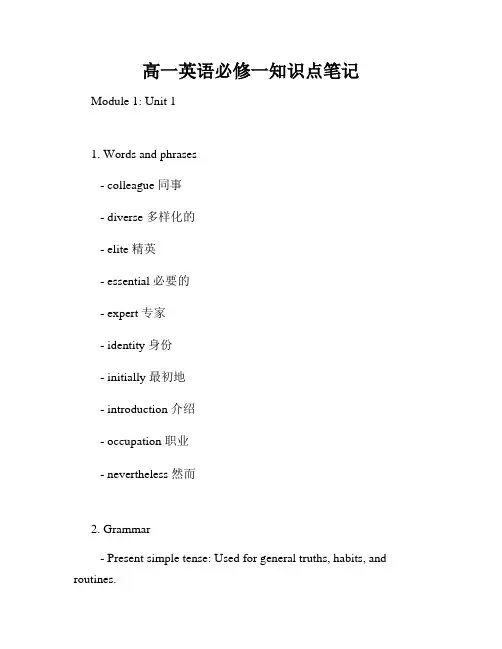
高一英语必修一知识点笔记Module 1: Unit 11. Words and phrases- colleague 同事- diverse 多样化的- elite 精英- essential 必要的- expert 专家- identity 身份- initially 最初地- introduction 介绍- occupation 职业- nevertheless 然而2. Grammar- Present simple tense: Used for general truths, habits, and routines.Example: The earth revolves around the sun.- Present continuous tense: Used for ongoing actions or temporary situations.Example: I am studying English at the moment.- Present simple vs. present continuous: The present simple is used for general truths, while the present continuous tense is used for actions happening at the moment of speaking.Example: She always drives to work. (Present simple)She is driving to work now. (Present continuous)- Adverbs of frequency: Used to indicate the frequency of an action.Example: I often go to the gym.Module 1: Unit 21. Words and phrases- accomplish 完成- ambition 雄心- conscious 有意识的- fulfill 实现- goal 目标- grateful 感激的- influence 影响- motivation 动机- overcome 克服- passion 热情2. Grammar- Modal verbs: Used to express ability, possibility, permission, and necessity.Example: You can call me later. (Permission)They must be at the airport by now. (Necessity)- Conditional sentences: Used to express outcomes based on certain conditions.Example: If it rains, we will stay at home.- Passive voice: Used when the subject of the sentence is acted upon.Example: The book was written by Mark Twain.- Indirect speech: Used to report what someone else said.Example: She said that she was tired.Module 2: Unit 11. Words and phrases- adapt 适应- behavior 行为- communicate 交流- conflict 冲突- contribute 贡献- ignorance 无知- respect 尊重- tolerate 容忍- value 价值观- viewpoint 观点2. Grammar- Comparative and superlative forms of adjectives: Used to compare two or more things.Example: He is taller than his sister. (Comparative)It is the most beautiful city in the world. (Superlative)- Adverbs of manner: Used to describe the way an action is performed.Example: She sings beautifully.- Conditional sentences (second and third conditionals): Used to talk about hypothetical situations and their outcomes.Example: If I had more money, I would travel the world. (Second conditional)If I had studied harder, I would have passed the exam. (Third conditional)Module 2: Unit 21. Words and phrases- adventure 冒险- authentic 真实的- civilization 文明- destination 目的地- landscape 风景- mainland 大陆- minimize 最小化- remote 偏远的- spectacular 壮观的- unique 独特的2. Grammar- Reported speech: Used to report what someone else said, thought, or believed.Example: She told me that she was going to the party.- Reported questions: Used to report questions in indirect speech.Example: She asked me if I had seen her keys.- Passive voice: Used when the subject of the sentence is acted upon.Example: The bridge was built in 1870.- Relative clauses: Used to provide additional information about a noun.Example: The book that you gave me is very interesting.Note: This is a brief summary of the knowledge points covered in the first module of the first compulsory English course for Year One. Please refer to the textbook for more detailed explanations, examples, and exercises. Happy studying!。
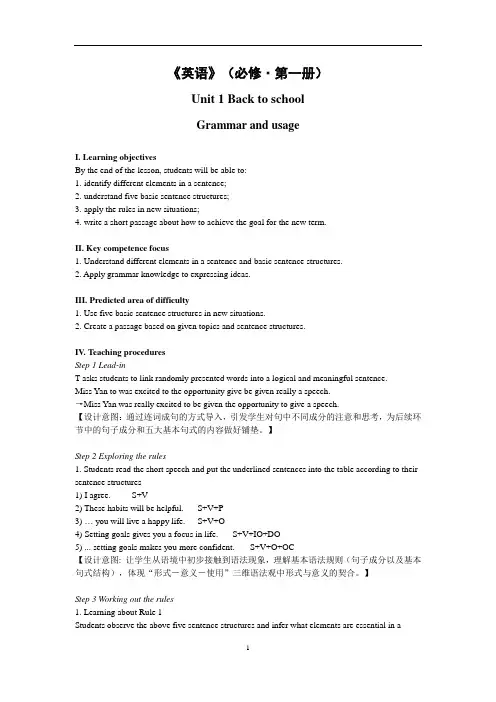
《英语》(必修·第一册)Unit 1 Back to schoolGrammar and usageI. Learning objectivesBy the end of the lesson, students will be able to:1.identify different elements in a sentence;2.understand five basic sentence structures;3.apply the rules in new situations;4.write a short passage about how to achieve the goal for the new term.II. Key competence focus1. Understand different elements in a sentence and basic sentence structures.2. Apply grammar knowledge to expressing ideas.III. Predicted area of difficulty1. Use five basic sentence structures in new situations.2. Create a passage based on given topics and sentence structures.IV. Teaching proceduresStep 1 Lead-inT asks students to link randomly presented words into a logical and meaningful sentence.Miss Yan to was excited to the opportunity give be given really a speech.→Miss Yan was really excited to be given the opportunity to give a speech.【设计意图:通过连词成句的方式导入,引发学生对句中不同成分的注意和思考,为后续环节中的句子成分和五大基本句式的内容做好铺垫。
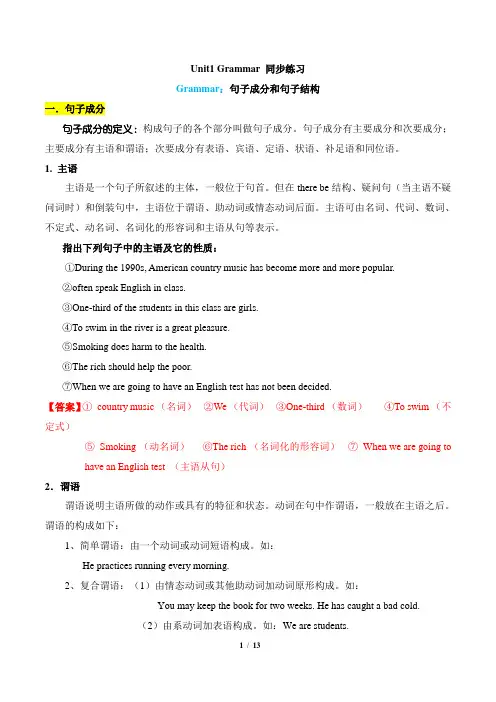
Unit1 Grammar 同步练习Grammar:句子成分和句子结构一.句子成分句子成分的定义:构成句子的各个部分叫做句子成分。
句子成分有主要成分和次要成分;主要成分有主语和谓语;次要成分有表语、宾语、定语、状语、补足语和同位语。
1. 主语主语是一个句子所叙述的主体,一般位于句首。
但在there be结构、疑问句(当主语不疑问词时)和倒装句中,主语位于谓语、助动词或情态动词后面。
主语可由名词、代词、数词、不定式、动名词、名词化的形容词和主语从句等表示。
指出下列句子中的主语及它的性质:①During the 1990s, American country music has become more and more popular.②often speak English in class.③One-third of the students in this class are girls.④To swim in the river is a great pleasure.⑤Smoking does harm to the health.⑥The rich should help the poor.⑦When we are going to have an English test has not been decided.【答案】①country music (名词)②We (代词)③One-third (数词)④To swim (不定式)⑤Smoking (动名词)⑥The rich (名词化的形容词)⑦When we are going tohave an English test (主语从句)2.谓语谓语说明主语所做的动作或具有的特征和状态。
动词在句中作谓语,一般放在主语之后。
谓语的构成如下:1、简单谓语:由一个动词或动词短语构成。
如:He practices running every morning.2、复合谓语:(1)由情态动词或其他助动词加动词原形构成。


Book 1 Unit 1 Food mattersGrammar and usageTo-infinitives as subjects and predicatives一、教学目标By the end of this section, students will be able to:1. identify the use of to-infinitives as subjects and predicatives;2. work out the rules of to-infinitives used as subjects and predicatives;3. distinguish and use the right form of to-infinitives to finish tasks of rewriting sentences and completing amagazine article;4. apply to-infinitives in new situations.二、教学重难点1. To distinguish and use the right form of to-infinitives to finish tasks;2. To apply to-infinitives in new situations.三、教学过程步骤教学活动设计意图互动时间/模式Lead-inStep 1 1. The teacher has students read the blog entry onPage 6 and complete a mind map.2. The teacher has students complete the table ofPart A on Page 6.通过阅读,引导学生了解“外出吃饭和在家做饭”这个语篇的脉络框架,并在此基础上观察文中动词不定式的使用情况。
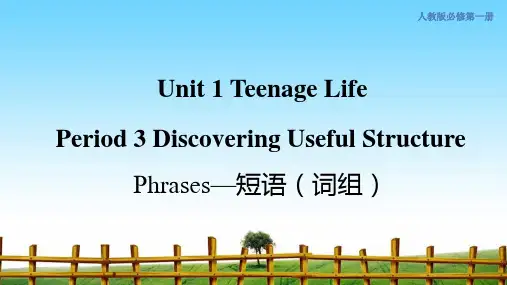
Unit1 语法课名师课后评估单【教材版本与册数】人教版必修1【单元名称】Unit1:Friendship【课时】第3课时【课型】Grammar(语法课)Part 1基础达标题:I. 将所给直接引语变为间接引语,每空一词:1. “I am having supper,”he said.He said that _______ _______ having supper.2. “I’ve seen the film,”Gina said to me.Gina _______ me that she _______ _______ the film.3. “I went home with my sister,”she said.She said that _______ _______ _______ home with her sister.4. The teacher said, “The sun is bigger than the moon.”The teacher said that the sun _______ bigger than the moon.5. “I met her yesterday,” he said to me.He told me that he _______ met her the day _______.6. “You must come here before five,” he said.He said that I _______ to go _______ before five.7. “I bought the computer two weeks ago,” she said.She said that she _______ bought the computer two weeks _______.8. “Did you read the book last week?” he said.He _______ _______ I had read the book the week _______.9. He said, “You can sit here, Jim.”He _______ Jim that he _______ sit there10. He asked, “How did you find it, mother?”He asked her mother _______ _______ _______ found it.Part 2能力提升题:I. 把下列的句子变成间接引语或直接引语:1. “I’m leaving for London next week.” My sister said to me.2. John said, “Mr. Smith has come here.”3. She said, “Do you want me to help you?”4. “Does the man in the shop find his wallet at last?” She said.5. Mum said to th e newcomer, “Can you speak English?”6. Father asked me who had broken the window.7. She asked me which one I liked the best.8. He asked whether I had watched TV the night before.9. Jim asked me if I was busy that day.10. Pick said that he would take Mary there the next time.【参考答案】Part 1基础达标题:1. he, was。